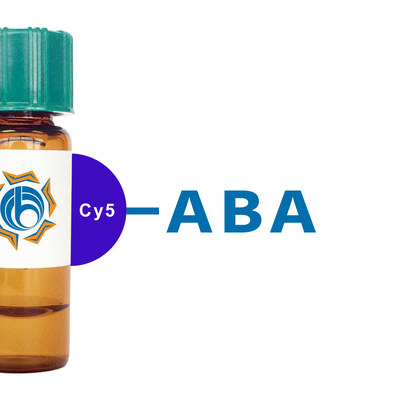Amaranthus caudatus Lectin (ACL/ACA) - Cy5
Price: Regular price $0.00
Product Description
Affinity-purified Amaranthus caudatus (ACL/ACA) is a dimer glycoprotein made up of two subunits. ACL has preferential specificity to oligosaccharides containing the galactosyl disaccharide Galβ3GalNAc. ACL tolerates sialic acid substitution at the 3 positions of galactose in the “T” antigen. It does not have specificity for blood groups but does have a higher affinity for type O erythrocytes over B and A.
Cy5, when bound to Amaranthus caudatus Lectin (ACL/ACA), can show the binding pattern of this lectin in cellular imaging and flow cytometry. The excitation wavelength required for Cy5 to fluoresce is high enough to avoid overlapping with most other fluorochromes, making it useful for dual-labeling experiments. Because of this high excitation, there is typically less background from autofluorescence of biological specimens.
Recommended Usage: Recommended dilution is 0.5-10 µg in 1XPBS. Less than 0.5 µg/ml will agglutinate neuraminidase treated human erythrocytes.
Technical Specifications
| Abbreviation | : | ACL/ACA |
| Material Source: | : | Tassle flower |
| Conjugate: | : | Cyanine 5 (Cy5) |
| Concentration: | : | 1 mg/mL |
| Molecular Weight: | : | 54 kDa |
| Shelf Life: | : | 1 year |
| Blood Group Specificity: | : | Non-specific |
| Preferred Sugar Specificity: | : | Galβ3GalNAc |
| Inhibiting or Eluting Sugar: | : | Disialyzed Fetuin |
| Fluorescence: | : | Red |
| Divalent Ions: | : | None Required |
| Excitation: | : | 650 nm |
| Emission: | : | 670 nm |
| Mitogenic Activity: | : | Yes |
| Lyophilized or Liquid | : | Liquid |
| Storage Temperature: | : | -20°C |
| Hazardous Shipping: | : | Non-hazardous |
Applications
Immunofluorescence, Immunohistochemistry, Immunocytochemistry, Glycobiology, Biomarker.
References
1. Rinderle SJ, Goldstein IJ, Matta KL, Ratcliffe RM. Isolation and characterization of amaranthin, a lectin present in the seeds of Amaranthus caudatus, that recognizes the T- (or cryptic T)-antigen. J Biol Chem. 1989 Sep 25;264(27):16123-31.
2. Rinderle SJ, Goldstein IJ, Remsen EE. Physicochemical properties of amaranthin, the lectin from Amaranthus caudatus seeds. Biochemistry. 1990 Nov 20;29(46):10555-61.






